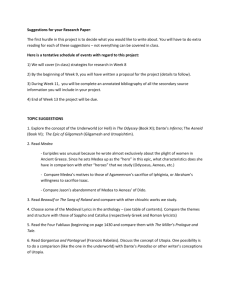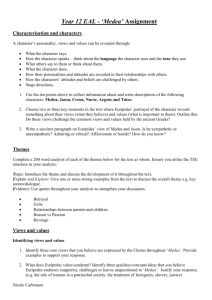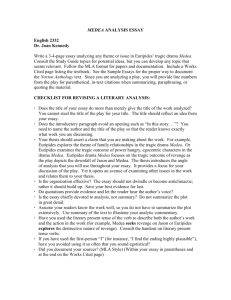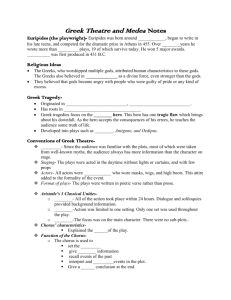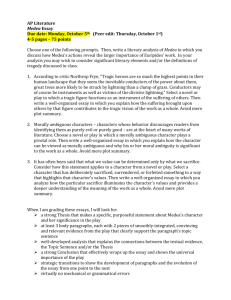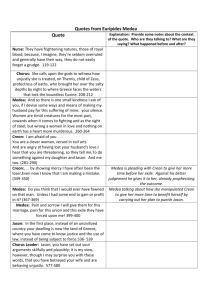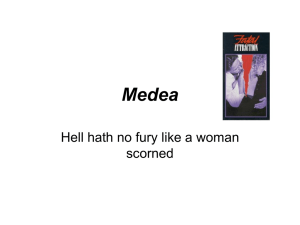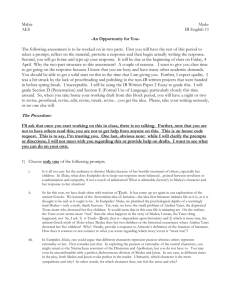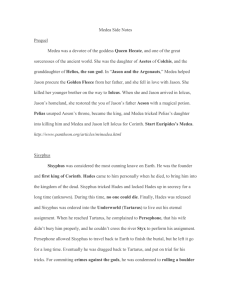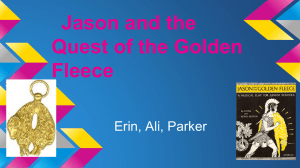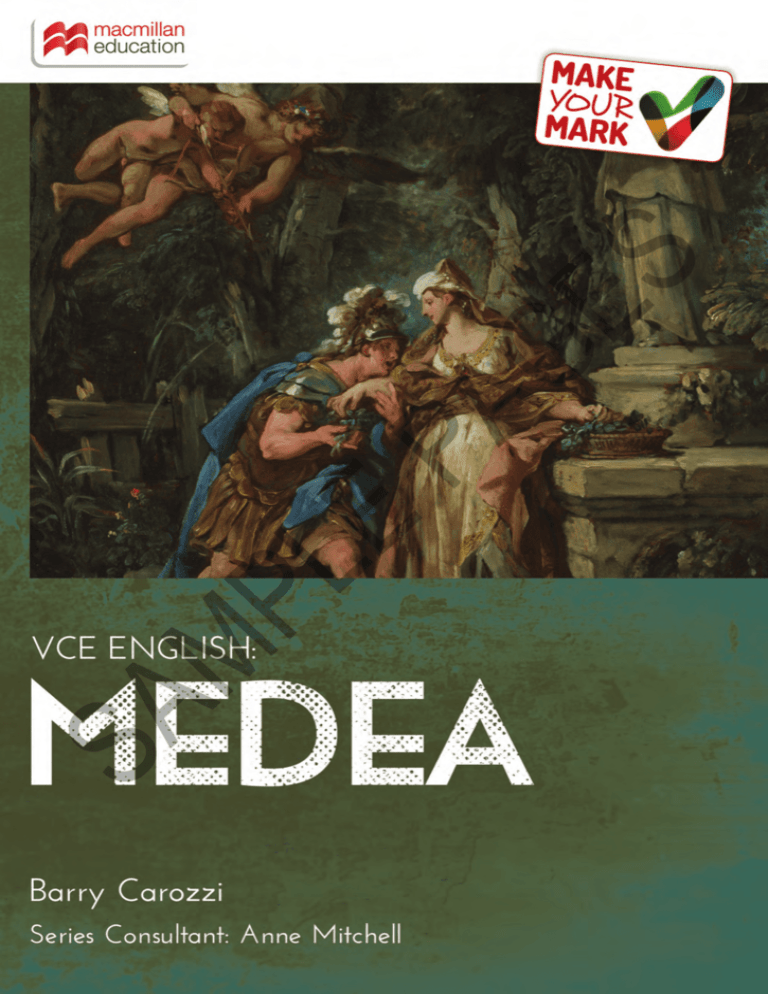
LE
MP
SA
PA
GE
S
S
GE
PA
LE
SA
MP
VCE ENGLISH:
MEDEA
Barry Carozzi
Series Consultant: Anne Mitchell
Contributor: Denise Kirton
First published 2016 by
MACMILLAN EDUCATION AUSTRALIA PTY LTD
15–19 Claremont Street, South Yarra, VIC 3141
Visit our website at www.macmillan.com.au
Associated companies and representatives
throughout the world.
All rights reserved.
Except under the conditions described in the
GE
The moral rights of the author have been asserted.
S
Copyright © Macmillan Education 2015, 2016
Copyright Act 1968 of Australia (the Act) and subsequent amendments,
no part of this publication may be reproduced,
stored in a retrieval system, or transmitted in any form or by any means,
PA
electronic, mechanical, photocopying, recording or otherwise,
without the prior written permission of the copyright owner.
Educational institutions copying any part of this book
for educational purposes under the Act must be covered by a
Copyright Agency Limited (CAL) licence for educational institutions
LE
and must have given a remuneration notice to CAL.
Licence restrictions must be adhered to. For details of the CAL licence contact:
Copyright Agency Limited, Level 15, 233 Castlereagh Street, Sydney, NSW 2000.
Telephone: (02) 9394 7600. Facsimile: (02) 9394 7601. Email: info@copyright.com.au
SA
MP
Publication data
Author: Barry Carozzi
Title:
Make Your Mark VCE English: Medea
ISBN:
978 1 4586 5358 1
Publisher: Emma Cooper
Project editor: Diana Saad
Editor: Rosemary Peers
Cover designer: Dimitrios Frangoulis
Text designer: Richard Pearson
Photo research and permissions clearance: Vanessa Roberts
Typeset in Sinkin Sans by DiZign Pty Ltd
Cover image: Getty Images/Heritage Images
Printed in Australia
CONTENTS
PREFACE
iv
ACKNOWLEDGEMENTS
vi
CHARACTER SUMMARIES
1
ISSUES, THEMES AND LIKELY QUESTION TOPICS
7
Possible topics
8
10
S
GET REVISING
Revising for your exams
The nature of English
GE
About the exam paper
Planning a response
How you will be assessed
Impressing the examiner
Top tips for success in Section A
A note of advice
Now you’re prepared …
MARK IT!
MODEL ESSAY 1
PA
Practise, practise, practise
LE
Deconstruct the question
10
10
11
14
20
21
22
23
25
26
27
28
28
‘Medea is a study of injustice, betrayal and revenge.’ Discuss.
Mark it!
Marker’s comments
SA
MP
MODEL ESSAY 2
Deconstruct the question
29
36
38
38
‘I am finished, my friends, and any pleasure I took in life I now renounce; it’s death I want.’
Medea is the chief victim in Euripides’s play. To what extent do you agree?
Mark it!
39
Marker’s comments
43
MODEL ESSAY 3
45
Deconstruct the question
45
‘Jason’s decisions are based on reason and careful judgement; Medea’s decisions are based
on passion and selfishness.’ To what extent do you agree?
Mark it!
46
Marker’s comments
52
WHAT HAVE YOU LEARNED?
54
USEFUL VOCABULARY
55
GLOSSARY
57
978 1 4586 5358 1
iii
VCE English: Medea
PREFACE
Euripides’s play Medea was written hundreds of years before the New Testament—almost 2500 years
ago. Euripides was an Athenian, born around 485 BCE. From 455 BCE till his death in 405 BCE, he was
a regular competitor in the great Athenian festival of tragedy. Medea was featured in the festival of
431 BCE, when Euripides would have been around 54 years of age. These dramatic festivals were highly
S
competitive and, like modern-day film festivals, they attracted large audiences—historians estimate that
up to 14 000 Athenians might have attended the open-air performances. In his ‘General Introduction’ to
Euripides: Medea and Other Plays, Dr Richard Rutherford describes the strict rules that governed the
GE
structure and performance of these plays. A close reading of Rutherford’s introduction will enrich your
understanding of Medea.
The stories explored in the Greek tragedies were the ancient myths. Rutherford notes that ‘the
dramatists use myth to distance their stories in time, and so give them universality … [They] … show us
PA
men and women who are remote from us in circumstance, yet vividly like us and real in their hopes, fears
and desires’. The great Greek philosopher Aristotle regarded Euripides as ‘the most intensely tragic of
all the poets’ and, indeed, Medea deals with deeply disturbing aspects of human nature. In a nutshell,
Medea assisted the great Greek hero Jason in his quest to recover the mythic Golden Fleece. The pair
fell in love. Medea gave up everything for her love of Jason, deserting her homeland after playing a key
role in the murder of her brother and Jason’s uncle Pelias. The pair travelled to Corinth and had two sons
LE
together. Then Jason betrayed her, leaving her so he could marry a royal princess, the daughter of the
Corinthian king, Creon. Devastated by this betrayal, Medea took her revenge by poisoning Creon and his
daughter, and murdering her own sons.
Despite the ancient origins of Medea, the ideas and themes explored in the play have immediate and
SA
MP
powerful relevance for 21st-century readers:
•
•
•
•
•
How important is ‘our word’? Should promises be kept and should oaths be honoured?
How should men and women treat each other?
What is the relationship between passion and reason?
How should ‘insiders’ treat ‘outsiders’?
How should we handle our strongest feelings, like anger, and our human desire for vengeance?
One of the things that struck me when reading Medea was how little human nature has changed over
the past 2000 years. Euripides speaks to us across the centuries and what he invites us to engage with
is how flawed we are as human beings.
This book is written for students of VCE English. The first half is intended to help you better understand
the demands and expectations of the ‘Analytical response to text’ section of the VCE English
examination paper. The central focus is this: how can you best prepare for this section of the English
paper? The answer is pretty straightforward:
iv
978 1 4586 5358 1
i.
Make sure you understand what the examiners are looking for. What are the skills you are expected
to display? What are the criteria by which your essay will be judged?
ii.
Make sure you understand how to make sense of the essay topic. How do you deconstruct the
prompt and the task so that you can achieve the best possible result?
iii.
Make sure you understand how to plan and write your essay.
The second half of the book consists of three model essays. You are encouraged to ‘become the marker’.
You are provided with the key criteria, and your task is to mark each essay in terms of these criteria. The
S
annotations on the essays draw your attention to particular aspects of the model essays. Through this
activity you will come to a better understanding of what your teachers and exam markers are looking for
GE
when they assess your essays. In turn, this will help you when you come to write practice essays.
The key advice this book has to offer is that the way to improve your ability to write clearly, fluently,
insightfully, coherently and in an organised manner is to practise regularly.
In the VCE English examination you will have roughly one hour in which to produce your essay. In
that time you should be able to produce between 600 and 1000 words. The model essays provided
PA
in this book are a little longer than that, around 1700 to 2000 words. This is deliberate. The goal is to
demonstrate a number of conceptual points about both the text and about essay-writing techniques.
When you write your own practice essay, you will be developing more and more sophisticated skills in
terms of:
deconstructing essay topics
planning essays that respond to the specific expectations of examiners
LE
•
•
•
•
•
demonstrating your knowledge and understanding of the text
constructing essays that are coherent
supporting your thesis—your viewpoint of the question or prompt—with relevant quotes, scenes or
SA
MP
characters from the play
•
writing well-constructed, clear and fluent sentences.
I wish you the very best in your VCE English examinations, and hope that this book will assist you in that
demanding challenge.
Barry Carozzi
978 1 4586 5358 1
v
Character summaries
S
CHARACTER
SUMMARIES
GE
MEDEA
Medea is the central character of the play. It may be useful to undertake some research into Medea’s
life as she appears in a number of ancient myths. Medea is a grandchild of Helios, one of the gods of
Olympus. She possesses powers of sorcery and has the gift of prophecy. (This helps to explain why Creon
is so wary of her and so fearful of what she might do.) When Jason and his Argonauts go on the quest
PA
to recover the Golden Fleece, it is Medea whose magical powers and assistance make it possible for
Jason to achieve his goal. Aphrodite intervenes to ensure that Medea falls obsessively in love with Jason.
While Euripides’s account of this episode in Medea’s life contains some reference to the gods, it makes
very little reference to Medea’s magical powers. When Medea first appears, she is in a terrible state—
deeply depressed and contemplating suicide. This mood of hopelessness is short-lived. Soon she is
LE
focused on making Jason pay for his betrayal of her, and for the pain he has caused her.
Through its exploration of Medea’s plight, the play examines the subjugation of women in a patriarchal
society. Many of these themes have a thoroughly modern ring and resemble the concerns raised by the
SA
MP
feminist movement of the 20th and 21st centuries:
•
•
•
•
•
the domestic isolation of women
the expectation that women will submit to the sexual demands of men
the pain of childbirth
the relative freedom of men to walk away from marriage and their obligations
the isolation of rejected women.
KEY QUOTES
Early in the play, Medea is overcome by grief and pain:
‘I am finished, my friends, and any pleasure I took in life I now renounce; it’s death I want.’ p. 56
‘The man who was the world to me ... has proved to be the foulest of traitors, my own husband.’ p. 56
‘Abandoned, homeless, I am a cruel husband’s plaything, the plunder he brought back from a foreign
land, with no mother to turn to, no brother or kinsman to rescue me from a sea of troubles and give me
shelter.’ p. 57
978 1 4586 5358 1
1
VCE English: Medea
POSSIBLE TOPICS
While you are revising for your examination, consider the points listed below. How would you handle
them if they were presented to you as exam questions? What evidence from the text would you use to
support your arguments?
If you have considered in advance a wide range of perspectives and ideas relating to the text, you are
S
more likely to be able to think on your feet on the day. Read through the essay topics below and make
notes on:
what your position is in relation to the statement or quote. Do you agree? Disagree? Can you see
both sides?
•
what evidence from the play supports your position?
•
PA
WOMEN IN SOCIETY
GE
•
The Chorus supports Medea and considers that women suffer at the hands of men. ‘Men make
deceitful plans and the pledges they swear in the name of the gods no longer stand firm …
Discuss.
•
•
LE
Recompense is coming for the female sex. No more shall we women endure the burden of ill-repute.’
Jason is the real criminal in Medea. Do you agree?
‘Women are timid creatures for the most part, cowards when it comes to fighting and at the sight of
steel; but wrong a woman in love and nothing on earth has a heart more murderous.’ Medea’s actions
SA
MP
throughout the play challenge the stereotypical gender roles of women in society. To what extent do
you agree?
•
Jason tells Medea: ‘You women have reached the point where you think your happiness is complete
when love smiles on you but, should some misfortune mar that love, you take all that is good and
beautiful in life and turn it into grounds for bitter hatred.’ Euripides believes that the embittered views of
women in the play Medea are justified. Discuss.
JUSTICE AND INJUSTICE; PROMISES
AND OATHS
•
‘All this I have done for you and yet you have betrayed me, you unfeeling monster … gone is the trust
to be placed in oaths.’ Much of the suffering endured by the characters in Medea stems from the way
these characters do not remain true to their word. To what extent do you agree?
8
978 1 4586 5358 1
VCE English: Medea
GET REVISING
S
REVISING FOR YOUR EXAMS
GE
The new VCE English course, to be introduced in 2017, offers you a wealth of stimulating, exciting
literature and will open your eyes to new ways of viewing the world around you. Hopefully you will enjoy
reading the texts and discussing the characters and ideas they explore. Come the end of the year,
though, there are the exams to contend with. Preparing for any exam can be stressful, whether you like
the subject or find it difficult. Most students undertake five VCE subjects in Year 12 and preparing for five
PA
examinations is a big task. There are many demands on your time.
You need to be sure that you’re using your time wisely and being as effective as you can in your revision.
Good organisation is the key. Being organised enables you to prepare well for the examinations.
There are several things you can do to ensure you feel confident when it’s time for the exam and to help
you achieve your full potential. One of the first things is to familiarise yourself with the structure of the
how to prepare.
LE
VCE English examination papers. Knowing what to expect in the exam is the first step towards knowing
SA
MP
THE NATURE OF ENGLISH
Before we look more closely at what the exams require, it’s important to consider the difference between
English and other subjects. Some people find English a difficult subject to study for because it does
not centre on a set of facts or content to be learned, and the exam does not rely on how well you recall
information. While the tasks set for VCE English will draw on your knowledge of texts, you cannot predict
what the topics will be, and you will need to be able to think on your feet. The exam will expect you to
demonstrate your capacity to write clearly, fluently, insightfully, coherently and in an organised manner in
response to a topic that you have not seen before.
NO RIGHT ANSWER?
There is no single right answer for the kinds of questions asked in Section A of a VCE English
examination. VCE English is about thinking and the interpretation of texts. It is about reading and
responding to texts, thinking about ideas and developing an interpretation—or exploring possible
10
978 1 4586 5358 1
Get revising
interpretations—of texts. Most importantly, it is about examining those interpretations and finding
evidence from the text that supports your point of view.
This lack of a ‘right answer’ is a challenge but it does allow you a chance to explore ideas and develop
your own views. Each reader may respond to a given text differently—the key is being able to justify an
interpretation.
For example, we can imagine a number of interpretations for the characters’ actions in Medea, all of
which can be supported with evidence from the text:
that Jason’s infidelity and breaking of his oath of marriage to Medea was the major factor causing
Medea to kill her two sons, Creon and Creon’s daughter, Glauce.
S
•
•
that in the debate between Jason and Medea, Jason was clearly the winner—after all, the Chorus
•
that Medea was cool-headed and calculating in devising her plans for revenge.
GE
concede that he ‘set out (his) arguments skilfully and plausibly ’
Drawing on the text, a reader can mount a case to support any of these interpretations.
PA
None of the following interpretations of the text, however, can be supported with reference to the play,
and therefore cannot be accepted as part of your argument:
•
that Jason had an affair with Glauce because he discovered that Medea was having an affair
with Aegeus
that Medea was a play written by Shakespeare
that it was the Nurse who killed the children.
LE
•
•
SA
MP
ABOUT THE EXAM PAPER
The VCE English examination and the EAL examination differ in a number of ways. The differences are
summarised in the table below. EAL students should pay close attention to the requirements of the EAL
examination as outlined in the table and seek help from teachers to clarify any issues.
EXAM
VCE ENGLISH
EAL
TASK
EXAMINATION
EXAMINATION
Reading and
Section A
Section A
creating texts
LIST 1 TEXTS
THREE SET TEXTS
Students are required to write an
Students are required to write an
analytical response to one of the
analytical response to one of the three
texts from List 1.
set texts.
Two topics will be provided for each
Two topics will be provided for each of the
text on List 1. Students must choose
three texts. Students must choose one
one topic to respond to.
topic to respond to.
continued
978 1 4586 5358 1
11
Get revising
A ANALYTICAL RESPONSE TO TEXT: LIST 1
In the exam paper there will be 40 questions: two questions
for each of the 20 texts listed for study. Two questions will
relate to each of the texts you have studied. Once you have
the two questions to answer. Make it clear which of the two
questions you are responding to. You will be asked to respond
analytically to the text.
GE
B COMPARATIVE ANALYSIS OF TEXTS:
LIST 2
The model essays later
in this book relate to
Section A Analytical
response to text. In
them, you may come
across terms that
are new to you. You
can look these up in
the glossary for an
explanation.
S
chosen the text you will respond to, you must choose ONE of
List 2 will consist of a series of paired texts. Your school will
choose which pair of texts you will study in Semester Two. Each
pair of texts will deal with challenging ‘ideas, issues or themes
require you to compare the two texts.
PA
from different perspectives’. The examination question will
C ANALYSING ARGUMENT
LE
For this section of the examination requires you will be required
to analyse how composers of a range of text types (writers,
cartoonists, speakers and photographers and so on) use
argumentative and rhetorical strategies of various kinds to
persuade readers to their points of view. You must ‘analyse and
SA
MP
compare the use of argument and persuasive language in texts
that present a point of view on an issue currently debated in
the media’. The actual form of the task varies from year to year.
In recent years, the task has involved the following formats:
•
an editorial, two or more short letters to the editor,
photographs and a cartoon
•
•
a blog piece, five comments and a photograph
two opinion pieces and a cartoon.
The specific material that is to be analysed is different each
year. However, there are two things to note:
i.
Each year, each of the pieces of material relates to the
same issue.
ii.
The task remains the same: how does each writer seek to
use arguments, visuals and written language to persuade
The new VCE English
course, to be introduced
in 2017, refers to reading
and creating texts.
You will be required
to complete two pieces
of school-assessed
coursework (SACs)
during the first semester
in this segment of the
course. One will be an
analytical piece and the
other will be a creative
piece. Note that the
response you write in
the examination must
be analytical and NOT
creative.
the reader?
978 1 4586 5358 1
13
VCE English: Medea
Each section is worth one-third of the marks. Plan to spend an equal amount of time answering each
section. It might help you to think of the exam time as being composed of timeslots as follows:
Timeslot
Minutes
1 Reading
15
Get to the exam room early. Open your exam paper as soon as you are
able. Spend the 15-minute reading time carefully absorbing your tasks.
2 Planning
10–15
Once you have been given permission to start writing, jot down plans for
answers—especially for Sections A and B. In those first few minutes, you
will have lots of ideas flying around in your mind. It’s important to jot them
S
down, so you don’t lose them. Students often come out of the exam room
complaining: ‘Oh I had this great idea, but I forgot to include it’. Jot down a
3 Writing
50–55
Section A
GE
word or two as a reminder to yourself.
Write in as detailed a manner as you can within the time limit.
WHEN YOU FINISH:
stretch, loosen your muscles, drink some water.
4 Writing
50–55
Section B
Write in as detailed a manner as you can within the time limit.
WHEN YOU FINISH:
5 Writing
50–55
Section C
PA
stretch, loosen your muscles, drink some water.
Write in as detailed a manner as you can within the time limit.
WHEN YOU FINISH:
stretch, loosen your muscles, drink some water.
6 Revising
5–15
Go over your answers—especially the opening paragraphs of each
LE
answer. Correct any errors of spelling, punctuation or expression.
SA
MP
PLANNING A RESPONSE
Here is an idea for using the reading and planning time strategically. Give it a try with a practice question
and refine the model to suit you, if necessary.
A Analytical response to text
Quickly find the questions on Medea and decide which of the two options you will answer.
•
•
•
Identify the KEY WORDS.
DECONSTRUCT the TASK (see the section on this below).
Start thinking about how you will answer this question or respond to this task.
B Comparison of texts
Look at the PROMPT for this section of the paper and read over any support material—quotes,
photographs or other visuals.
•
•
•
14
Identify the KEY WORDS.
DECONSTRUCT the TASK.
Start thinking about how you will answer this question or respond to this task.
978 1 4586 5358 1
VCE English: Medea
In your essay, you will need to provide concrete examples or evidence from the text that support your
argument.
Evaluate
This topic verb requires you to make a decisive judgement based
on a criterion that you have either adopted from somewhere
else or created yourself. In other words, you are determining the
Do you agree? or To what extent do you agree …?
When you are asked these questions you are being asked to
GE
evaluate how accurate or true the statement is in relation to
the texts you have studied. You are being asked to make a
judgement based on criteria that you must establish yourself.
These criteria should be comprised of two or three central points
LESS COMMON TOPIC VERBS
Describe
PA
that you will elaborate on in your response.
Seven of the
40 questions in the
Text Response section of
the 2015 English paper
involved the phrases
‘to what extent’ or
‘do you agree’.
S
current or ongoing value of a text or an idea.
Here you are being asked to provide general information on the characteristics and features of a concept
Explain
LE
and/or a text. This prompt is similar to ‘outline’ (see below), but is looking for more detail and depth.
‘Explain’ is asking you to make the relationship between two or more things clear. This prompt involves
you identifying the connection, correlation or relationship between things and then providing evidence in
SA
MP
support of your claim from the text you have been studying.
Identify
Here you are being asked to recognise a particular element, idea or textual feature and to give it a
precise name or term, and then to discuss and explore this notion in detail.
Outline
‘Outline’ is asking you to give the general idea of a concept, to identify the major features or
characteristics. It is similar to ‘describe’, but requires less detail.
UNPACK THE QUESTION
Let’s look at an example question and break down the task of preparing an answer.
‘I am finished, my friends, and any pleasure I took in life I now renounce; it’s death I want.’ Medea is the
chief victim in Euripides’s play. To what extent do you agree?
18
978 1 4586 5358 1
VCE English: Medea
MODEL ESSAY 1
GE
S
DECONSTRUCT THE
QUESTION
To answer this question you will need to set the parameters for your argument with a definition of
PA
the word ‘study’. Consider what the purpose of a ‘study’ actually is, and in what sense this applies
to Medea.
SA
MP
Discuss.
LE
‘Medea is a study of injustice, betrayal and revenge.’
While ‘discuss’ is the topic verb, this topic asks
This statement identifies three themes
for more: it requires you to evaluate how true
in Medea. Your answer will need to
the statement is. Your answer will fall within a
evaluate the extent to which you agree
continuum from completely agreeing to completely
that they are the central themes, or
disagreeing, or somewhere in between. Your thesis
whether the text explores other more
will need to provide evidence for or against two
important themes.
propositions:
1. that Medea is a study
2. that the three themes identified are the
central concerns.
28
978 1 4586 5358 1
Model essay 1
GETTING STARTED
Make sure you have read the ‘Planning a response’ section on p. 14. Now that you’re ready to start, you
might find it helpful to ask yourself these questions:
•
Is it helpful to think of Medea as a ‘study’? Works of literature explore aspects of human nature, but is
that ‘exploration a ‘study’?
Does Medea explore the themes of ‘injustice, betrayal and revenge’ ?
Which characters and scenes in the play throw light upon these three themes?
Does Medea examine other major themes or issues?
S
•
•
•
•
What evidence will you draw on to support your main contention in response to this topic?
GE
Let’s see how the model essay tackles this topic. As you read, make notes or highlight/underline elements
of the model essay that exemplify strong writing techniques. The questions alongside the essay should
get you thinking about how the essay addresses the topic and how well it meets the requirements of
MARK IT!
PA
the rubric.
LE
‘Medea is a study of injustice, betrayal and revenge.’ Discuss.
SA
MP
The Greek tragedy Medea by Euripides is
a rich and complex exploration of many
aspects of the human condition. It closely
observes the intricacies of human nature,
including our capacity for revenge and
betrayal, and the effects of injustice,
but also delves into other important
issues concerning human behaviour and
interaction. To describe the play as a
‘study’ is misleading. When psychologists
undertake ‘studies’ of human behaviour,
their goal is to observe, measure and
perhaps draw definitive conclusions about
that behaviour. The definition of a study
is to acquire knowledge and understanding
of a subject. That is not the business
of literature, and Medea is not limited
to a particular subject. The role of
literature is to explore the breadth of
human experience—human life and the human
spirit in all of its conditions. The role
978 1 4586 5358 1
1.
As observed in the notes on
deconstructing the question, this
prompt has two elements: whether
Medea is a study, and whether the
three themes identified are the
central concerns. In your own words,
note the student’s response to each
of these concepts. This forms the
student’s thesis.
29

